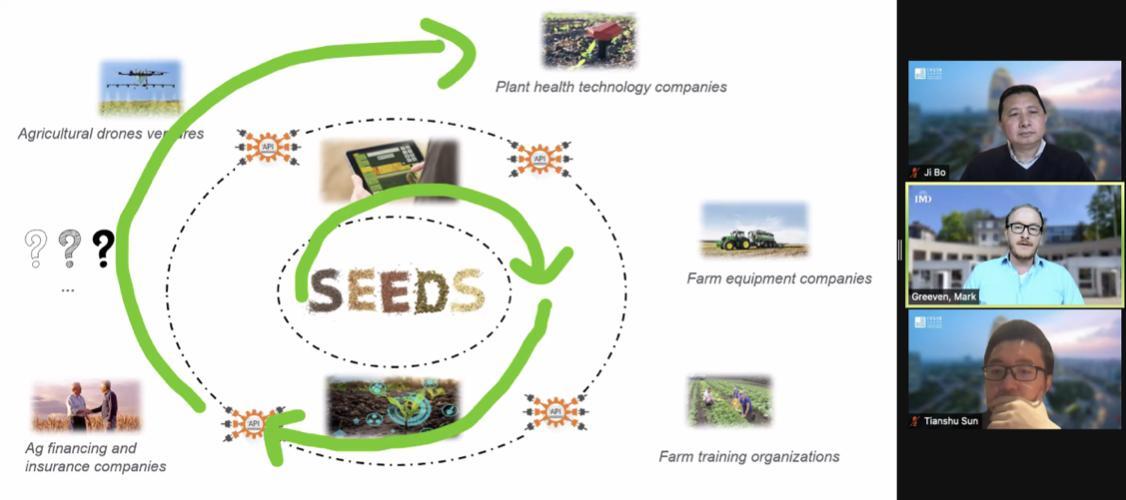
Ahead of the CKGSB-IMD program on Building Digital Ecosystems, the two schools held a taster webinar on September 26, titled “Digital Trends to Transform Your Business”, where CKGSB Visiting Professor of Information Systems Sun Tianshu 孙天澍 and IMD Professor of Innovation and Strategy Mark Greeven discussed the future of the global digital landscape in the context of ecosystems. The discussion was moderated by CKGSB Assistant Dean, Ji Bo. Over 200 registrants joined the event from over 54 countries.
During the webinar Professor Greeven summarized the concept of ecosystems well: “One of the basic premises of thinking about ecosystems and getting the ecosystem flywheel turning is the idea that we are going to work more in partnerships with other organizations to leverage the capabilities and experience that others have to jointly create value and more relevant impact for stakeholders and customers.”
He explained that ecosystems are going to change the way that companies think about creating growth through collaboration with partners. He referred to this as the ‘digital ecosystem economy’, which could be one of the main drivers of revenue in the future.
He noted how Amazon, Alibaba, and Facebook have created large digital platforms that have transformed into ecosystems. “Alibaba has a massive ecosystem with probably 850 million users, millions of merchants, hundreds of complementors and partners, and spanning across 25 different industry and sector boundaries,” he said.
His talk focused largely on how a traditional seed business started its flywheel and built its own ecosystem. After it built digital services that assisted farmers with tasks such as yield optimization, humidity level inspection etc, it was in a position to build an API – a software which allows for data transmission between one company’s software and another. This led the company to expand its partnerships with insurance companies, financial firms, and equipment providers.

Professor Greeven (middle) explains the flywheel model through a traditional seed producing business.
After Professor Greeven explained the concept of flywheel growth within digital ecosystems, Professor Sun Tianshu 孙天澍 delivered his keynote speech elaborating on several characteristics of ecosystems in China and the United States. Professor Sun, who has a wealth of experience working with companies in China and the U.S. from Alibaba to Facebook and Adobe, opened by saying, “Over the past 12 years in the U.S., I have seen a very interesting contrast between the digital ecosystems in Silicon Valley and China.”
He highlighted that TikTok and Douyin of ByteDance “operate in an entirely different landscape of competition and innovation.” A key difference between the two markets, he noted, lies in the fact that U.S. companies tend to focus on their own specialization, such as in the case of Facebook and social networks, whereas Chinese companies span across sectors to compete in several different businesses.
He described how ByteDance not only competes with Kuaishou on the video-sharing front, but also with JD.com and Alibaba in e-commerce. Meituan is another example which competes with DiDi in the ride hailing market and with Alibaba in food delivery. “If you choose any of the top two platforms in China, they’re competing very strongly on the same interests,” he emphasized. He shared that this concept of ecosystems differs to the U.S. where Google, Netflix, Amazon, and Facebook do not compete directly with each other.
He attributed the intense cross-sector competition to different monetization models in the U.S. and China. “The interesting thing about the two ecosystems is in China, people have a relatively low willingness to pay for content monetarization, and also the firms have a relatively low budget to pay for advertising.” He pointed out there is a much greater willingness in the West to pay on platforms such as Spotify, Netflix, and Apple Music. Moreover, he noted Chinese companies do not have the same advertising budget compared to companies like Nike and Sephora in the West.
Professor Sun further explained that competition has heightened recently due to geopolitical tensions thwarting Chinese companies to go down the globalization route. “So, all platforms want to grow across sectors and grow wider and wider. As a result, you see a lot of competition between different types of platforms in China, but in contrast, U.S. firms choose the globalization route because of radically lower globalization costs in terms of culture and language, and also [due to] the first mover advantage,” he said.
Professor Sun explained that the branching of Chinese companies across different sectors gives them an advantage in the scope and concentration of data. “This allows them to have a better understanding of consumers and SMEs and come up with new and applied fintech innovation and recommended systems, such as in the case of TikTok.” In contrast, he noted that the U.S. is far more data and research-driven with experts leading these efforts.
After both panellists delivered their keynote speeches, they answered questions from the audience. They particularly honed in on how ecosystems and digital transformation is disrupting traditional ideas. Professor Sun gave the example of the ancient industry of jade in China, which is completely being transformed by technology – particularly by the rise of live-streaming whereby he said sales have surged 10,000-fold since 2014.
“From the original mine to production, to pricing, to branding, to first-level sellers, all the way to retailers to the transaction of scale, this very long value chain is being disrupted by technology.” He further explained, “Technology enabled the re-design of the value chain…We need to re-think our value chains and how to satisfy consumer demand and re-organize the supply.”
Professor Greeven said traditional organizations and transforming incumbents will greatly benefit from the rise of ecosystems. “For a long time, digital giants have dominated this discussion, and owned the relationship between the consumer and themselves…Incumbent companies [will now] regain that competitive advantage by controlling and owning customer relations through digital means. And a digital ecosystem is one of the major tools or mechanisms to make that happen,” he said.
Building a digital ecosystem is a must in today’s digitalized world. For this reason, on November 11, CKGSB, in partnership with IMD, will be delivering a 5-week online virtual program, Building Digital Ecosystems, which will go into more depth on how businesses can leverage these ecosystems and partnerships to scale up. Click here to learn more.
Thank you to our partners for this webinar—IMD, Entrepreneurs Organization, The Salon, Impact 17+1 Club, SwissCham, and PCD Club—for their support.